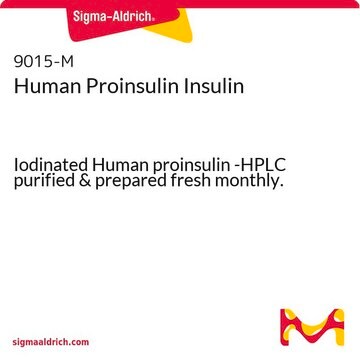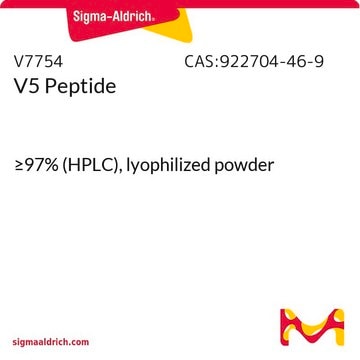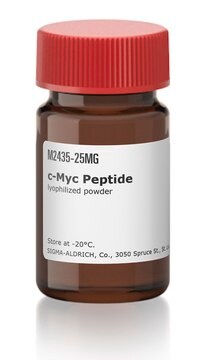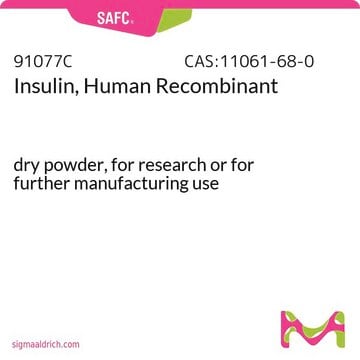C4999
Proinsulin C-Peptide (55-89) human
≥95% (HPLC)
Synonym(s):
Proinsulin connecting peptide
About This Item
Recommended Products
Product Name
Proinsulin C-Peptide (55-89) human, bioactive peptide hormone
Quality Level
assay
≥95% (HPLC)
form
powder
color
white
storage temp.
−20°C
SMILES string
CC(C)C[C@H](NC(=O)[C@H](CCC(O)=O)NC(=O)[C@@H](NC(=O)[C@H](CCC(N)=O)NC(=O)CNC(=O)[C@@H](NC(=O)[C@H](CCC(N)=O)NC(=O)[C@H](CC(C)C)NC(=O)[C@H](CC(O)=O)NC(=O)[C@H](CCC(O)=O)NC(=O)[C@H](C)NC(=O)[C@H](CCC(O)=O)NC(=O)[C@H](CCCNC(N)=N)NC(=O)[C@@H](N)CCCNC(N)=N)C(C)C)C(C)C)C(=O)NCC(=O)NCC(=O)NCC(=O)N1CCC[C@H]1C(=O)NCC(=O)N[C@@H](C)C(=O)NCC(=O)N[C@@H](CO)C(=O)N[C@@H](CC(C)C)C(=O)N[C@@H](CCC(N)=O)C(=O)N2CCC[C@H]2C(=O)N[C@@H](CC(C)C)C(=O)N[C@@H](C)C(=O)N[C@@H](CC(C)C)C(=O)N[C@@H](CCC(O)=O)C(=O)NCC(=O)N[C@@H](CO)C(=O)N[C@@H](CC(C)C)C(=O)N[C@@H](CCC(N)=O)C(=O)N[C@@H](CCCCN)C(=O)N[C@@H](CCCNC(N)=N)C(O)=O
InChI
1S/C153H259N49O52/c1-71(2)55-94(193-134(237)91(40-48-119(222)223)189-148(251)122(78(15)16)200-135(238)86(33-41-105(156)205)179-112(212)67-175-147(250)121(77(13)14)199-136(239)88(35-43-107(158)207)188-139(242)97(58-74(7)8)194-142(245)100(61-120(224)225)197-133(236)90(39-47-118(220)221)182-124(227)80(18)177-129(232)89(38-46-117(218)219)186-130(233)84(29-23-51-167-152(162)163)183-126(229)82(155)27-22-50-166-151(160)161)128(231)172-63-110(210)169-62-109(209)170-68-115(215)201-53-25-31-103(201)145(248)174-64-111(211)176-79(17)123(226)171-65-113(213)180-101(69-203)144(247)196-99(60-76(11)12)141(244)190-92(36-44-108(159)208)149(252)202-54-26-32-104(202)146(249)198-95(56-72(3)4)137(240)178-81(19)125(228)192-96(57-73(5)6)138(241)185-85(37-45-116(216)217)127(230)173-66-114(214)181-102(70-204)143(246)195-98(59-75(9)10)140(243)187-87(34-42-106(157)206)132(235)184-83(28-20-21-49-154)131(234)191-93(150(253)254)30-24-52-168-153(164)165/h71-104,121-122,203-204H,20-70,154-155H2,1-19H3,(H2,156,205)(H2,157,206)(H2,158,207)(H2,159,208)(H,169,210)(H,170,209)(H,171,226)(H,172,231)(H,173,230)(H,174,248)(H,175,250)(H,176,211)(H,177,232)(H,178,240)(H,179,212)(H,180,213)(H,181,214)(H,182,227)(H,183,229)(H,184,235)(H,185,241)(H,186,233)(H,187,243)(H,188,242)(H,189,251)(H,190,244)(H,191,234)(H,192,228)(H,193,237)(H,194,245)(H,195,246)(H,196,247)(H,197,236)(H,198,249)(H,199,239)(H,200,238)(H,216,217)(H,218,219)(H,220,221)(H,222,223)(H,224,225)(H,253,254)(H4,160,161,166)(H4,162,163,167)(H4,164,165,168)/t79-,80-,81-,82-,83-,84-,85-,86-,87-,88-,89-,90-,91-,92-,93-,94-,95-,96-,97-,98-,99-,100-,101-,102-,103-,104-,121-,122-/m0/s1
InChI key
JEPNOJXFZHBCTB-ZCUALFGZSA-N
Amino Acid Sequence
General description
Biochem/physiol Actions
Other Notes
Storage Class
11 - Combustible Solids
wgk_germany
WGK 3
flash_point_f
Not applicable
flash_point_c
Not applicable
Choose from one of the most recent versions:
Certificates of Analysis (COA)
Don't see the Right Version?
If you require a particular version, you can look up a specific certificate by the Lot or Batch number.
Already Own This Product?
Find documentation for the products that you have recently purchased in the Document Library.
Customers Also Viewed
Our team of scientists has experience in all areas of research including Life Science, Material Science, Chemical Synthesis, Chromatography, Analytical and many others.
Contact Technical Service




![[Tyr0]-C-Peptide / Proinsulin (32-63) Tyr0 ≥95% (HPLC)](/deepweb/assets/sigmaaldrich/product/images/791/565/a5de9e43-d366-4bf5-8cbe-c10642787b19/640/a5de9e43-d366-4bf5-8cbe-c10642787b19.jpg)



